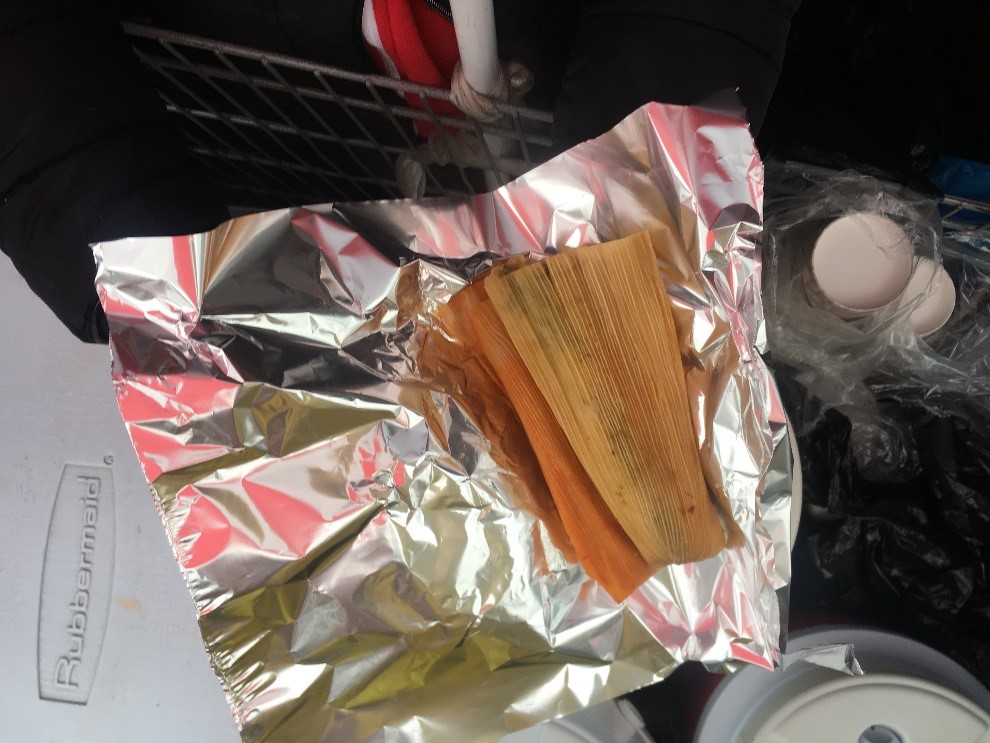
Antonio Guerrero and Leticia Rueda sell their tamales from a cart near a Bronx subway station, to eat standing at their cart or to go. Photo: Maura Whang.
It’s 7 a.m. on a Tuesday, the temperature hovers around freezing, and a flurry of puffy-coated subway passengers shuffle down the Manhattan-bound entrance to the 2 and 5 trains. A few feet from the stairs in front of a still-closed Game Express, Antonio Guerrero tends his tamale stand, a shopping cart fitted out with beverage coolers, Styrofoam cups in clear plastic bags, disposable forks, two larger containers beneath black trash bags, and a white plastic folding table. A smaller pushcart is stuffed with another large cooler.
Guerrero’s black and neon-green down coat and hood are cinched around everything but his eyes, and a generator hums at his feet. From amid the crowd of commuters, an embarrassed looking man approaches the stand, and barely above a whisper, in Spanish, implores Guerrero for something to eat. He’s hungry, and he hasn’t got any money. A moment later he is on his way, devouring a hot tamale.
Guerrero’s cart sits above the 3rd Ave-149th Street Station in the The Hub neighborhood of the Bronx, within the poorest congressional district in the United States, where almost half of the mostly Latin American residents live below the poverty line. It’s the second busiest station in the Bronx. Guerrero, 32, originally from Tlapa in the Mexican state of Guerrero, and his partner, Leticia Rueda, 40, from Puebla, wake up at 3 or 4 a.m. to set up their stand six days a week, twelve months a year. They’re open for business as early as 5 a.m., until either they run out of homemade tamales or until 9:30 a.m., because Game Express opens at ten.
The couple live a 25-minute walk east on Prospect Avenue with their two children, aged 6 and 4, as well as Rueda’s 14-year-old daughter and brother. This apartment is both home and business, with three refrigerators—one for the family and two for the business. Their carts packed to the brim, Guerrero and Rueda make the walk back and forth twice a day, often with the assistance of Samuel Teotichan, 32, who got a job working for the stand after seeing Guerrero on the street every day. A young woman they hired helps Rueda with the cooking.
After two years, Guerrero and Rueda are already a fixture, serving homemade tamales as well as an assortment of other Mexican eats and drinks, and are now a neighborhood information point as well. Not only do old friends and new regulars stop by to pick up breakfast or lunch, but passersby inquire constantly about directions or recommendations for the area.
Although Guerrero and Rueda cover the pay for three workers who assist them, as well as rent and bills, with the income generated from the stand, they’re exhausted. Tamales, atoles, and champurrado go for $1.50 each; the empanadas, flautas, sweet breads, and coffee are $1.00. On a good day they make a few hundred dollars. A vacation, let alone some time to sleep in, is out of the question. Bedtime is 7 p.m.
When they first opened, Rueda would sell out of 50 to 60 tamales in a few hours, seven days a week, while Guerrero worked a restaurant job and helped out on his days off. Three months later they would sell 100 to 110 a day. Today they come prepared with at least 160 tamales in five varieties, including rajas, verde, mole, rojo, and rojo picante. As the weather gets warmer Guerrero plans to include tacos, which he won’t serve in winter because they harden up too quickly, and fresh-squeezed juices.
Guerrero was happy to leave the restaurant business (“I have a mind to work for myself”), but it’s still not easy. Most days, while Rueda heads home to start the next day’s batch of tamales, Guerrero walks around the corner to Melrose Avenue to set up a fruit stand where he’s an employee until 6:30 p.m. Once a week the couple heads to Jetro in Hunts Point to pick up ingredients. They alternate days taking their children to school and Rueda makes time for her extended family in Brooklyn.
The couple met in 2011, the year Guerrero landed in New York, at El Aguila on the Upper East Side, where he worked. Rueda, who cooked at another Mexican restaurant, would come in every morning for breakfast. Guerrero had already lived in Guerrero, where his father sold chicharron and where he learned to prepare and cook pork, as well as in Mexico City, where at fifteen he helped out in his uncle’s three-seat rotisserie chicken restaurant, North Carolina, Palm Beach, and New Haven. He first found employment in New York washing dishes, but within a month was promoted to line cook. Rueda learned to cook from her mother in Puebla, and moved to New York when she was 25. In 2016 she starting making tamales from secret family recipes. Noting their superior quality to other tamales in town, family members suggested Rueda try to sell her own.
Guerrero is determined to take the next step and expand, his sights set on a larger space, potentially a storefront with his name over the door. He imagines advertising locally via Facebook; his fear is that he will still be selling tamales by the subway when he’s 40. “You always have to be positive. Sometimes business is good, sometimes it’s bad, but you have to keep moving.”
Tags: Mexican food, Tamales, the bronx, The Hub
Terrific story 👍